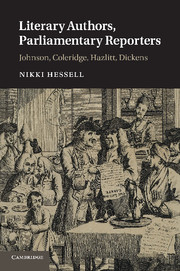Book contents
- Frontmatter
- Contents
- Acknowledgments
- Preface
- Chapter 1 Introduction: reporting and the individual talent
- Chapter 2 Samuel Johnson: beyond Lilliput
- Chapter 3 Samuel Taylor Coleridge and the freedom of the gallery
- Chapter 4 William Hazlitt and the real eloquence of the British Senate
- Chapter 5 Charles Dickens and the ghost of speeches past
- Chapter 6 Conclusion: taking parliamentary reporting seriously
- Bibliography
- Index
Chapter 6 - Conclusion: taking parliamentary reporting seriously
Published online by Cambridge University Press: 05 November 2011
- Frontmatter
- Contents
- Acknowledgments
- Preface
- Chapter 1 Introduction: reporting and the individual talent
- Chapter 2 Samuel Johnson: beyond Lilliput
- Chapter 3 Samuel Taylor Coleridge and the freedom of the gallery
- Chapter 4 William Hazlitt and the real eloquence of the British Senate
- Chapter 5 Charles Dickens and the ghost of speeches past
- Chapter 6 Conclusion: taking parliamentary reporting seriously
- Bibliography
- Index
Summary
The creative Johnson, the poetic Coleridge, the critical Hazlitt and the accurate Dickens: this study has not aimed to overthrow such characterizations but to situate them within the business of journalism. Understanding these writers’ careers as parliamentary reporters in the context of gallery journalism does not diminish their achievements, but rather reimagines them as journalistic, rather than pseudo-literary, successes. Moreover, it demonstrates that these authors drew strength from the standards of the gallery, whether such standards were conscientiously followed in the interests of pleasing existing readers or cleverly improvised upon in the interests of cultivating new ones. Johnson’s creative interpretation of the debates drew directly on the house style of the Gentleman’s Magazine, which was forged in the competition with the rival London Magazine. Although factual material was hard to come by, a premium was placed on any accurate information, and Johnson’s creative contributions were either built around or displaced by such information. Coleridge occupied an unusual, though not entirely unique, place in the gallery, with the freedom to report creatively and to shape the Morning Post’s coverage, but this freedom, like Johnson’s, derived from his editor’s desire to promote the paper in the competitive world of parliamentary coverage. Hazlitt adapted to the gallery with ease, utilizing the mixture of full reportage, summary, omission, and reconstruction from memory that other reporters were also employing. Dickens had the ability to produce verbatim reports but probably tempered this approach with the abbreviations and selectivity that was characteristic of journalists at the time.
Scholars have been right, therefore, to suggest that the reports of each of these authors manifested one or both of the virtues of creativity or accuracy, but have not adequately explained the historical context for these values, nor shown how common they were in the normal gallery practices of each author’s era, albeit shaped and modified by new developments in the gallery’s operations and the market for parliamentary journalism. Too little of the extant scholarship has been informed by recent developments in periodical studies, developments which have led to a much more sophisticated and thorough consideration of the way journalism operates in the literary marketplace. The existing accounts instead promote the rather old-fashioned idea that literary talent allows these reporters to see beyond the norms of their time and create something superlative out of the unpromising material of a parliamentary address. The experience of working in the gallery can thus be easily accommodated into established narratives about the authors’ lives and works by tracing their individual literary styles back to their reports.
- Type
- Chapter
- Information
- Literary Authors, Parliamentary ReportersJohnson, Coleridge, Hazlitt, Dickens, pp. 167 - 174Publisher: Cambridge University PressPrint publication year: 2011



